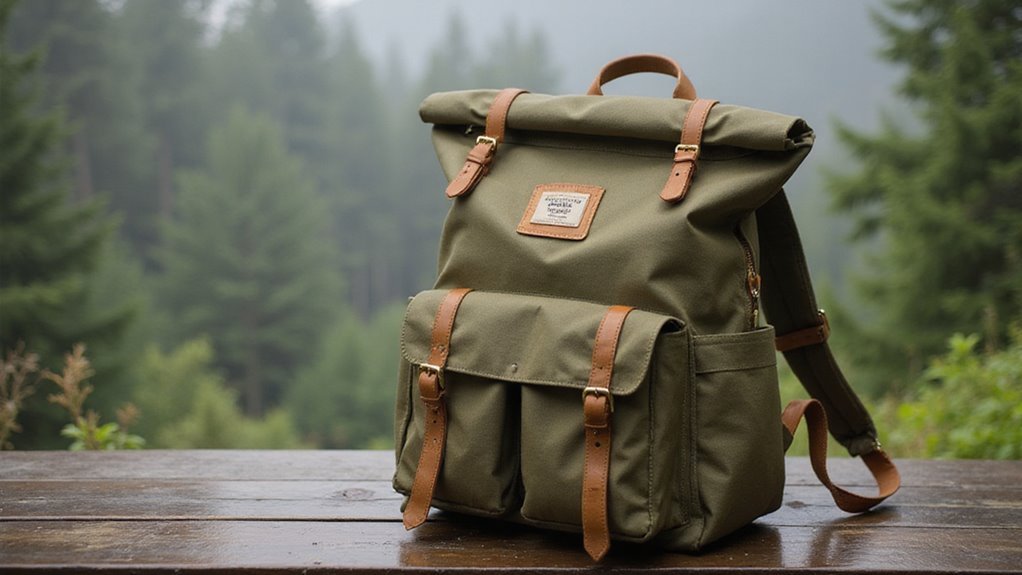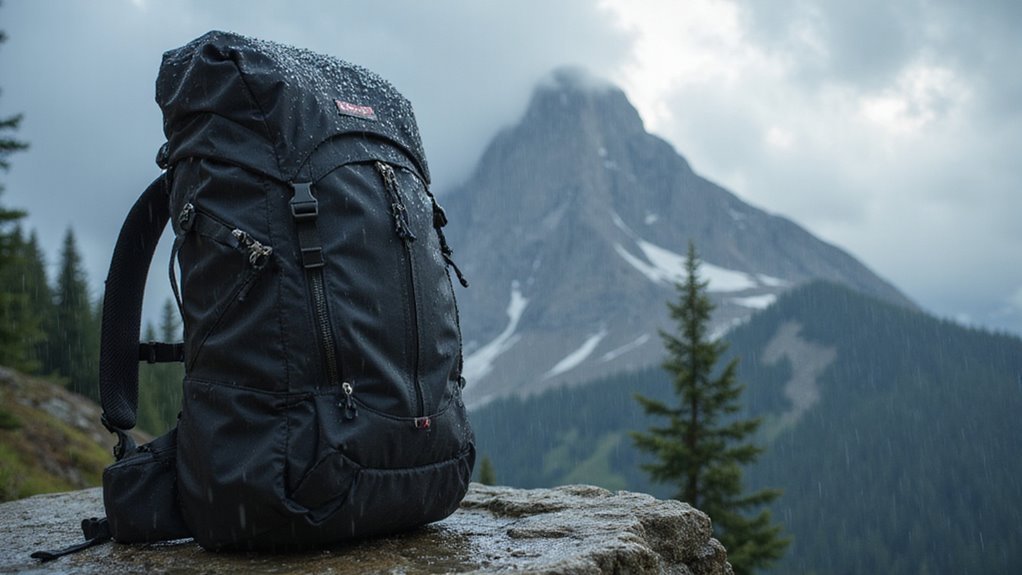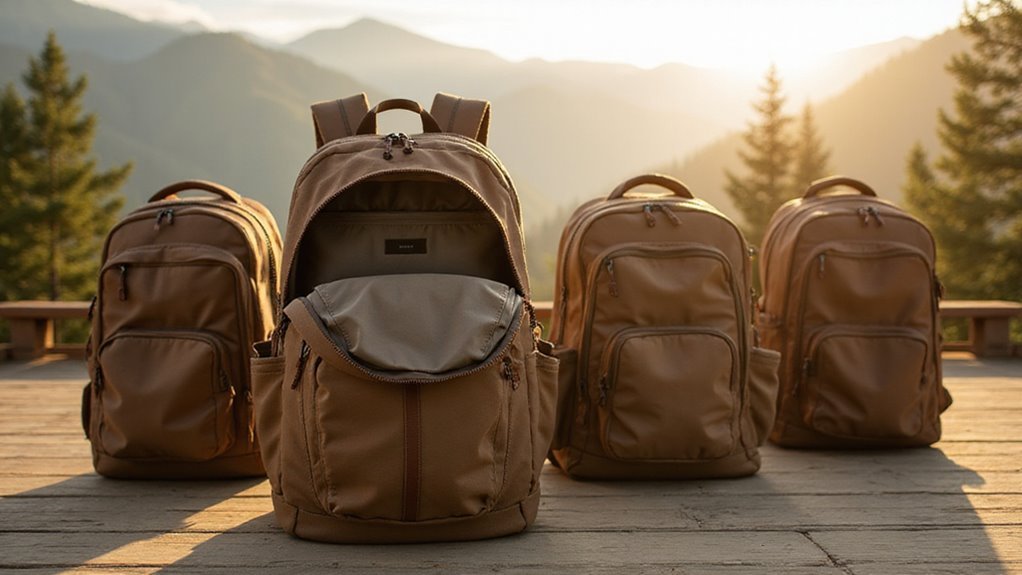Most conventional hiking backpacks contain hidden animal products like leather reinforcements and beeswax waterproofing. We’ll cut through the greenwashing to identify truly vegan packs that don’t compromise on performance or durability. From Patagonia’s recycled nylon designs to REI’s synthetic alternatives, we’ve tested the top contenders across multi-day treks and technical terrain. Let’s examine which vegan backpacks actually deliver on their eco-friendly promises.
Top-Rated Sustainable Materials in Hiking Backpacks

While traditional hiking backpacks often rely on environmentally harmful materials, today’s sustainable options leverage cutting-edge eco-friendly components that don’t sacrifice performance.
We’re seeing incredible innovations in vegan leather backpacks made from recycled materials – specifically recycled polyester that’s both durable and planet-friendly.
These eco-friendly backpacks feature Bluesign-approved fabrics, ensuring strict environmental standards from start to finish. Look for PFC-free durable water repellents that protect without toxic chemicals.
The best part? Many come from Fair Trade Certified™ factories, so you’re supporting ethical labor practices. It’s a win for performance, the planet, and the people making your gear. Additionally, these designs often prioritize circular economy principles, ensuring longevity and reduced waste throughout the product lifecycle.
Essential Features for Trail-Ready Vegan Packs
We’ve covered the materials – now let’s get tactical about what makes a vegan pack trail-worthy. The best vegan backpacks combine essential features that maximize performance while minimizing environmental impact. Let’s break down what matters most:
| Feature | Why It Matters |
|---|---|
| Water Resistance | Protects gear from rain and moisture |
| Adjustable Fit | Guarantees comfort on long treks |
| Lightweight Design | Reduces fatigue, increases mobility |
| Versatile Storage | Organizes gear efficiently |
These features aren’t just nice-to-haves – they’re non-negotiable for serious hiking. Look for packs that nail all four without compromising sustainable materials or durability. Additionally, ensure that the backpack includes integrated rain covers to safeguard your gear during unexpected storms.
Durability and Weather Resistance Ratings

Since your hiking pack needs to handle everything nature throws at it, let’s decode those cryptic durability ratings and weather resistance specs.
Today’s vegan backpacks feature military-grade waterproof materials and reinforced seams that laugh in the face of rough terrain.
We’re seeing brands like Patagonia crush it with 100% recycled polyester construction that’s both bombproof and eco-friendly.
Look for weather resistance ratings that specifically mention water-resistant coatings – they’re non-negotiable for serious trail use.
Additionally, consider the IPX rating system to ensure your backpack can withstand the elements effectively.
The best part? Most manufacturers back their durability claims with solid warranties.
No more worrying about your gear failing mid-adventure.
Leading Brands in Eco-Conscious Hiking Gear
Modern trailblazers have seriously upped their game when it comes to eco-conscious gear makers. The best vegan hiking gear now comes from industry titans who’ve embraced sustainability without compromising performance.
Leading brands like REI Co-op, Patagonia, and The North Face are setting new standards with recycled materials and ethically made products.
- REI Co-op’s Trail 40 Pack proves eco-conscious design can handle serious terrain.
- Patagonia’s commitment to sustainable vegan materials makes them a top choice for conscious hikers.
- The North Face integrates recycled fabrics while maintaining their legendary durability standards, aligning with the principles of sustainable fashion.
Price Points and Value Comparison

Let’s talk money – because even the most earth-friendly gear needs to fit your budget.
The best vegan hiking backpacks range from £150 to £350, with standout options like LaBante London offering recycled nylon adventure gear at wallet-friendly prices.
We’re seeing major brands like Patagonia delivering competitive value through sustainable materials and durability.
Here’s the smart play: investing more upfront in climate-neutral certified backpacks often saves money long-term.
You’ll find sweet spots around £200 where quality meets affordability.
Watch for deals – like the Acacia Laptop pack’s current £65 discount – to score premium gear without the premium price tag. Additionally, consider durability expectations as a crucial factor when evaluating long-term value in your backpack investment.
Frequently Asked Questions
Are Nordace Backpacks Vegan?
We can confirm most Nordace backpacks are vegan-friendly, using synthetic materials in their eco-friendly practices. While not explicitly labeled vegan, their durable designs typically avoid animal-derived components in their features.
What Is the Difference Between Hiking and Trekking Backpacks?
Like siblings with different personalities, hiking backpacks carry lighter outdoor essentials for day trips, while trekking backpacks offer advanced weight distribution, comfort factors, and extra space for longer journeys with all your gear.
Are Leather Backpacks Comfortable?
We find leather backpacks quite comfortable when they’re well-designed, thanks to their ability to mold to our bodies, though weight considerations matter. Proper padding and adjustable straps enhance comfort despite heavier material.
What Are the 2 Types of Backpacks in Hiking?
You’d think we’d need dozens of pack types, but we’ve really got just two main categories: daypacks for short adventures (20-35L) and backpacking packs for multi-day journeys (40L+).